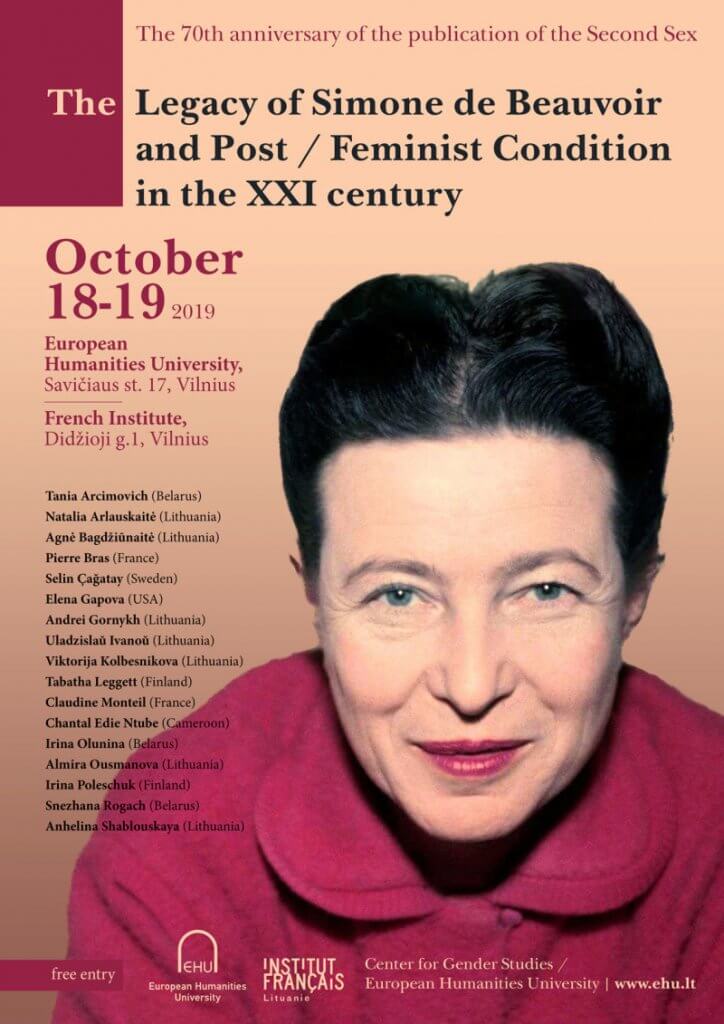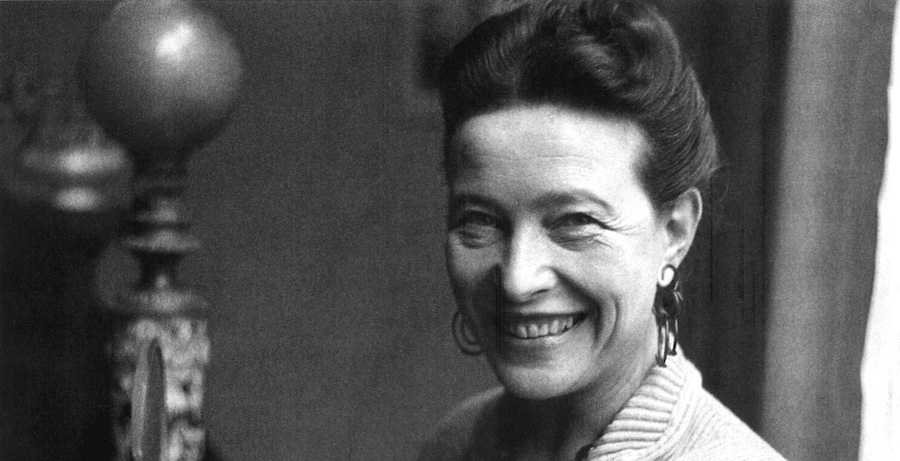 At this conference dedicated to the modalities of reception of the work of Simone de Beauvoir in today’s’ world, we would like to discuss the relevance of her texts and theoretical propositions for understanding contemporary realities. Rethinking the feminist heritage of Simone de Beauvoir, through the prism of the post/feminist condition, one has to take into account the decades of feminist practices and achievements – political as well as theoretical. If to compare with the social and economic context of the 1940s, when Second Sex was published, the situation has considerably changed. As Simone de Beauvoir wrote, ”capabilities are clearly manifested only when they have been realized”. These words better, than any other, characterize that what we refer to as ”postfeminist condition”.
At this conference dedicated to the modalities of reception of the work of Simone de Beauvoir in today’s’ world, we would like to discuss the relevance of her texts and theoretical propositions for understanding contemporary realities. Rethinking the feminist heritage of Simone de Beauvoir, through the prism of the post/feminist condition, one has to take into account the decades of feminist practices and achievements – political as well as theoretical. If to compare with the social and economic context of the 1940s, when Second Sex was published, the situation has considerably changed. As Simone de Beauvoir wrote, ”capabilities are clearly manifested only when they have been realized”. These words better, than any other, characterize that what we refer to as ”postfeminist condition”.
The gains of feminism in different spheres of social life are unquestionable (including the strengthening of the role of institutional feminism in the EU through the policy of gender mainstreaming, but also on a global scale). However, the appearance of the new forms of feminist activism and mass involvement of women in these campaigns and practices (like #MeToo) can be read as a symptom of the mutation of the patriarchal order, that produces new hierarchies and forms of subjugation in the condition of changing economy, political regimes and techno-scientific landscape. In other words, feminism faces with new challenges in a situation when old problems – economic inequality, political disparity, gendered division and conditions of labour, domestic and symbolic violence – not only did not disappear but, instead, take new forms and disguise themselves under different rhetoric.
Nowadays the political concerns of feminism often find an echo in cinema, artistic practices, and literary works. These representations receive worldwide feedbacks, raise feminist awareness, foster public debates and strengthen solidarity around the issues of gender equality. It is well known, that for Simone de Beauvoir as well as for many feminist thinkers after her, intellectual work and writing were inseparably connected with political engagement. In this sense, the explosion of such genre as feminist dystopias should be seen as the creative response to misogynous and antifeminist attitudes.
Thus, taking into account different political, cultural and economic conditions for feminist intellectual work and social activism, we invite scholars, feminist activists and artists to rethink Simone de Beauvoir’s works and legacy in the context of contemporary feminist debates and practices and from multidisciplinary perspectives.
Click here to learn about the agenda of the conference
The Conference takes place on October 18-19 at the European Humanities University Campus (located at 17 Savičiaus Str., Vilnius, Lithuania). The working languages of the conference are English and French.
Keynote speaker of the Conference Dr. Claudine Monteil will deliver two external lectures under the auspices of the Organizing Committee members.
On October 17 at 6.30 pm at the French Institute in Vilnius (located at 1 Didžioji Str.) Dr. Monteil will deliver a lecture in French (with translation into Lithuanian) “Un témoignage sur la modernité de l’engagement de Simone de Beauvoir au XXIème siècle”. More information about the lecture available online (in French).
On October 18 at 11:30 am at the Vilnius University Institute of International Relations and Political Sciences (located at 10 Vokiečių Str.) Room 402 Dr. Monteil will deliver a lecture in English “Feminism and/in Diplomacy”. More information about the lecture available online (in Lithuanian).
There are no conference fees, however, the participants are expected to cover their own expenses for travel and accommodation in Vilnius.
The conference is organized with the support of the French Institute in Lithuania.
Conference Organising Committee (can be reached via uladzislau.ivanou @ ehu.lt):
- Prof. Natalija Arlauskaitė (Vilnius University, Lithuania)
- Assoc. Prof. Elena Gapova (University of Western Michigan, USA)
- Dr. Uladzislaŭ Ivanoŭ (European Humanities University, Lithuania)
- Assoc. Prof. Irina Poleshchuk (University of Helsinki, Finland)
- Prof. Almira Ousmanova (European Humanities University, Lithuania)
